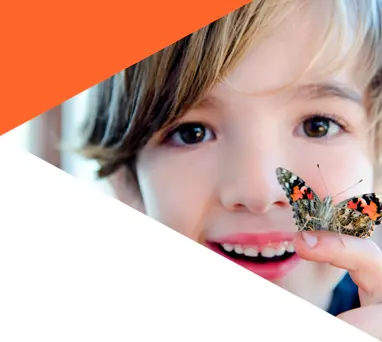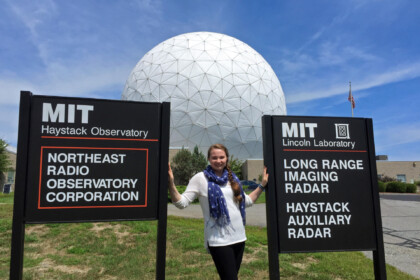
Students in STEM Profile Series

Star Student: Chelsea Crowley

As a child in Forestdale, Chelsea Crowley used to gaze at the night sky. Today she is a student pursuing a career in Astronomy at Cape Cod Community College. A 2014 graduate of Sturgis Charter School, 24-year-old Chelsea knew she wanted to study science on day one of her astronomy class at 4 C’s. She values science for its focus on creativity, observation, and discovery, and credits the college with helping her get where she is today as she pursues her own career while working to promote science opportunities for other students. She finds that most people in STEM are open and willing to share their experiences and advice, and seeks to do the same through the information sessions she has created to help students access internship information. Chelsea is the first student to be highlighted in our Students in STEM Profile Series.
1. What did you want to be when you grew up?
I was encouraged to appreciate science, especially astronomy, from a young age. My parents used to wake my brother and me up early in the morning so we could watch meteor showers in the backyard or bring us down to the beach to stargaze. Looking back now, I see where my love of astronomy began. I enjoyed science throughout school. One of my favorite teachers in middle school taught seventh-grade science. He was enthusiastic, positive and really loved teaching. I definitely didn’t realize it at the time, but he was an early influence on my path to becoming an educator myself. In my junior year of high school, I had to select a science focus, so I took biology because I felt it was a solid foundation for anything I may choose. I did not seriously consider a future in STEM until taking astronomy at 4C’s.
2. Why 4C’s?
I knew I wanted to have a few years to take some general education courses and explore my many interests, so I decided community college was a good fit. It’s close to home, offers smaller class sizes, and more opportunity for communication between students and faculty. My years at 4C’s helped me realize how important quality is over quantity in terms of education and that it’s not about racing to finish a degree. I may be taking an unconventional route, but I recognize that my years here are a chance to take advantage of all that 4C’s can offer.
3. How have you maximized the potential of what you can do at 4C’s?
After taking the introductory astronomy course at the college and finding strength in the topic, I was asked to become a supplemental instructor (SI). I have had many leadership roles on campus, including working as a peer tutor and mentoring incoming students, but supplemental instructing has been the most rewarding. Helping to restructure courses and improve students understanding led me to discover a natural ability and intuition for astronomy and physics education, something that wasn’t in my plans but fits so perfectly I can’t see my life any other way now. I am very lucky to have the privilege of collaborating with Professor Eric Arsznov in his physics and astronomy courses.
4. What was your summer Research Experience for Undergraduates (REU) with MIT Haystack Observatory like?
Amazing! I had never been exposed to real-world research before, so this was a great chance for me to try it out. I had the opportunity to work with researchers at the observatory and at Harvard’s Black Hole Initiative on my project, which was imaging black holes with the Event Horizon Telescope (EHT), a network of radio telescopes aimed at taking the first image of a black hole. The project involved a lot of computer science and imaging which was something I had minimal experience in, but that was what was so great about it. Working through the steep learning curve was very rewarding and I finished the program with many new skills. REU’s are a wonderful opportunity to work with professionals in your field and meet fellow undergraduates from other universities who share similar interests.
5. How are you converting your incredible REU experiences into information sessions you can share with others?
I started the information sessions for fellow SI leaders last spring as a way to share the experiences I’ve had on my STEM journey and get the word out about internship opportunities. There are so many opportunities available for community college students, but many don’t know where to begin the search. REU’s may seem like they are only for undergraduates from bigger universities, but many programs are seeking students from varied undergraduate levels and backgrounds. Some even take a special interest in you if you are a student pursuing an REU from a community college. It can be very difficult to navigate the vast opportunities that are available to undergraduates, so I felt it was important to show students ways to find internships and also promote undergraduate research at the community college level. I’ve found that sharing some of my tips and tricks with SI’s is a great way to get information out to other 4C’s students because they can take what they learn and pass it along to their study session groups and classes. I have had great feedback from 4C’s students who were unaware that they could get involved in real-world research at other universities and organizations while attending a two-year school. One of the best ways to find research internships is going to the National Science Foundation (NSF) website and searching for REU’s in your field. The NSF funds a wide variety of research projects, mostly in STEM, located all over the world. Students can also contact Bridget Burger, Director of the Cape Cod Regional STEM Network, for more information on internships.
6. Where are you headed next?
I plan on finishing my bachelor's degree in Astronomy at UMass Amherst, then earning my masters in Physics Education Research. I do not have one particular school that I am set on attending for graduate studies and intend to apply to Montana State, University of Maine, University of Michigan and the University of Maryland. I would like to teach physics and astronomy at a community college where I hope to help students become more involved in the learning process, understand content rather than just memorize material, and develop an appreciation for STEM.
Article by Mary Petiet.